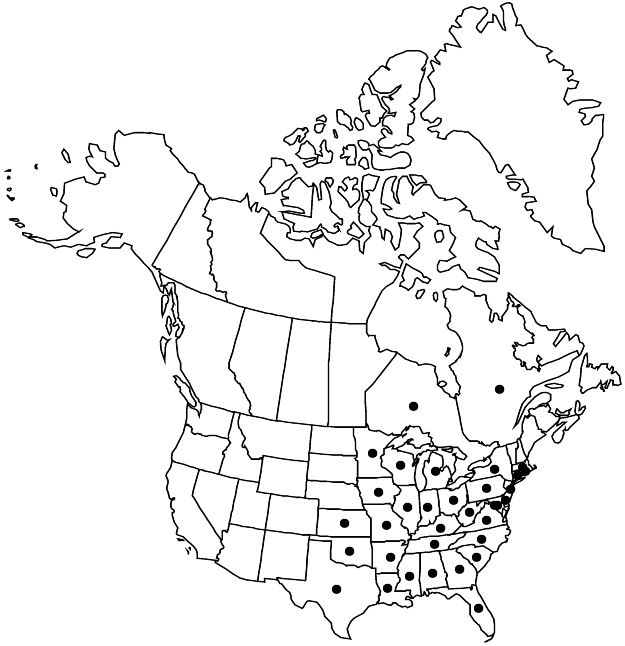Difference between revisions of "Crataegus crus-galli"
Sp. Pl. 1: 476. 1753.
imported>Volume Importer |
RevisionBot (talk | contribs) m (Bot: Adding category Revised Since Print) |
||
| Line 75: | Line 75: | ||
}}<!-- | }}<!-- | ||
| − | -->[[Category:Treatment]][[Category:Crataegus (sect. Coccineae) ser. Crus-galli]] | + | --> |
| + | |||
| + | [[Category:Treatment]] | ||
| + | [[Category:Crataegus (sect. Coccineae) ser. Crus-galli]] | ||
| + | [[Category:Revised Since Print]] | ||
Latest revision as of 18:08, 6 November 2020
Shrubs or trees, 50–100 dm, often with tabulate branching. Stems: twigs: new growth glabrous, 1-year old pale brown, older gray; thorns on twigs often ± recurved, 2-years old dark gray to blackish, ± stout, 3–6 cm. Leaves: petiole obsolescent or 5 mm, length 0–7% blade, glabrous, eglandular; blade usually deep green, very shiny adaxially, broadly spatulate to narrowly oblanceolate or narrowly elliptic, 2–7 cm, coriaceous, base tapered, lobes 0, margins serrulate to finely crenate, teeth 1 mm, venation semicamptodromous, veins 4–7 per side, apex acute to obtuse, adaxial surface glabrous, sometimes sparsely hairy young, glabrescent. Inflorescences 8–20-flowered; branches usually glabrous; bracteoles linear, small, margins sessile-glandular. Flowers 12–17 mm diam.; hypanthium glabrous; sepals 5–6 mm, margins ± entire, adaxially glabrous; stamens 10 or 20, anthers ivory to pink to red; styles 1 or 2(or 3). Pomes usually ruddy to crimson, sometimes bright yellow, ± oblong to suborbicular, 8–15 mm diam., often pruinose, glabrous; sepals patent-reflexed; pyrenes 1 or 2(or 3). 2n = 34, 51, 68.
Distribution

Ont., Que., Ala., Ark., Conn., D.C., Del., Fla., Ga., Ill., Ind., Iowa, Kans., Ky., La., Mass., Md., Mich., Minn., Miss., Mo., N.C., N.J., N.Y., Ohio, Okla., Pa., R.I., S.C., Tenn., Tex., Va., W.Va., Wis., introduced in Europe.
Discussion
Varieties 2 (2 in the flora).
Crataegus crus-galli is one of the more abundant North American hawthorns and has been reported as naturalized in Holland and other parts of Europe. It may occur in more or less pure stands sometimes many hectares in size. This species is variable, a situation attested to by its synonymy, most of which belongs to var. crus-galli. Some forms are locally distinct and may represent apomictic clones. In this treatment, only one variety other than var. crus-galli is recognized, this on the basis of leaf shape.
Selected References
Key
| 1 | Leaf blades: relatively wide (1.5:1–2.5:1). | Crataegus crus-galli var. crus-galli |
| 1 | Leaf blades: extremely narrow (greater than 2.75:1). | Crataegus crus-galli var. pyracanthifolia |